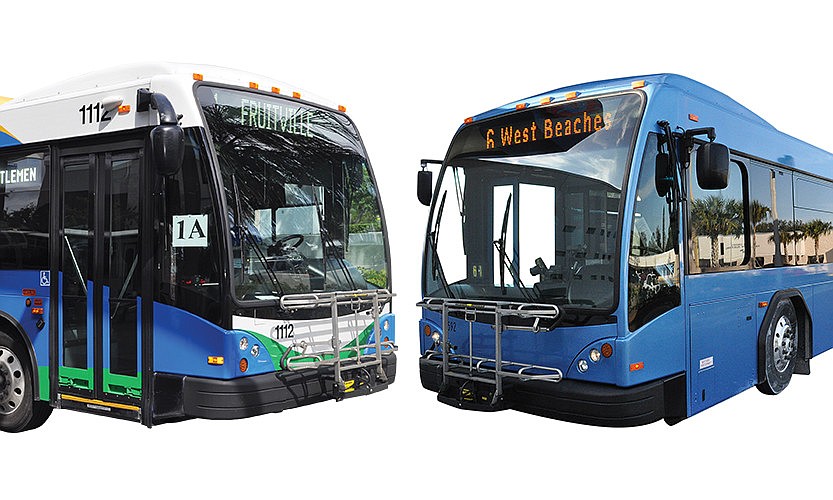- April 23, 2024
-
-
Loading

Loading

EAST COUNTY — For the neighbors who just collaborated to bring a world rowing championship here, an effort by Manatee and Sarasota counties to merge their transit systems is the link to connect a grand vision.
Commissioners representing both counties have already met privately to discuss jointly operating their services — Manatee County Area Transit (MCAT) and Sarasota County Area Transit (SCAT) — under a single, private manager.
They will come together for a public discussion Oct. 15, at a joint commission meeting dedicated to the topic, at the Bradenton Area Convention Center, where the commissioners will try to set an interlocal agreement allowing them to secure a procurement for private sector bids to run a shared system.
“There are lot of good things happening in the near future,” said Jim Van Pelt, a public transportation planner for the Sarasota-Manatee Metropolitan Planning Organization. “It’s not if, but when. There is so much interaction between the two counties, it stands to make sense to have easier access between them.”
Manatee County leaders and transit experts believe any such system could be a model for the Tampa Bay region.
Pinellas and Hillsborough counties have explored the idea.
Ed Hunzeker, Manatee County administrator and a proponent of a merger since he assumed his position in 2006, says any shared transit system will increase efficiencies without adding costs to taxpayers.
He cites a system in St. Louis that began when he was chief financial officer of a regional transportation authority there in the 1980s.
That service, run by a private management firm, serves seven counties in two states.
Similarly, the Central Florida Regional Transportation Authority serves Orange, Seminole and Osceola counties in the Orlando area.
Hunzeker says talk about shared bus service has nothing to do with recent growth in the counties. Rather, a change in leadership at both the transit agencies has pushed a long-stalled and overdue idea.
 “This is the starting point for a bigger project,” Hunzeker said. “It has been a vision of a lot of people for a long time. This has nothing to with the Mall at University Town Center and the rowing. It has everything to do with improving the ability of people to get around. We can’t keep spending money on widening roads and building multi-roads. We can take advantage of efficiencies from shared transit, and with money saved from efficiencies we can expand service without going to taxpayers.”
“This is the starting point for a bigger project,” Hunzeker said. “It has been a vision of a lot of people for a long time. This has nothing to with the Mall at University Town Center and the rowing. It has everything to do with improving the ability of people to get around. We can’t keep spending money on widening roads and building multi-roads. We can take advantage of efficiencies from shared transit, and with money saved from efficiencies we can expand service without going to taxpayers.”
MCAT’s 2013 farebox recovery, a measure of how much of the operating budget is offset by riders’ fares, was 12.8% — leaving a significant amount of the budget for a private company to offset with cost-saving measures.
The conversation comes as an MPO consultant, Tindale-Oliver & Associates, completes a study to determine if bus service can serve Lakewood Ranch, a growing, urban-trending, master-planned community with no mass transit.
Van Pelt says Tindale-Oliver has designed three alternative routes (see map) that identify how bus service would work in Lakewood Ranch. A project-review committee made up of MPO board members, MCAT and SCAT staff and Florida Department of Transportation employees will review the routes later this month and recommend one for the Manatee County Board of County Commissioners to approve. State funding for the cause becomes available in fiscal year 2015-16, so implementation of bus service to Lakewood Ranch would not begin until then.
As Lakewood Ranch waits, MCAT and SCAT have already made moves to collaborate.
The two agencies co-operate Route 99, which travels north and south on U.S. 41, servicing passengers from Palmetto to downtown Sarasota. MCAT and SCAT have two buses each serving that route.
SCAT has a partnership with Benderson Development to design a transfer station at the northeast corner of North Cattlemen and DeSoto roads.
Van Pelt says SCAT and MCAT will meet at the location — by the Mall at University Town Center — to provide services east and west.
SCAT has also been working on a route that will also help serve shoppers and employers at the under-construction mega mall.
The two-bus route will start on U.S. 41 and will serve Sarasota-Bradenton International Airport and areas along University Parkway to University Town Center and Benderson Park.
Hunzeker said, depending on the proposals private firms provide in the procurement phase, the governments would decide if more buses or people are required for the expanded service.
A new shared system would still be publicly owned and funded, and the governments could still apply for federal grants to add buses and other capital.
Money from taxpayers, which Hunzeker and MPO officials say won’t change, won’t cross county lines.
When the governments receive the proposals, county staff will rank the best ones and commissioners vote on the best one. Or they can reject the plan all together.
A public hearing will likely come at some point.
The two counties do have obvious differences. SCAT, with more routes and, thus, capital and people, is unionized, while MCAT is not.
But the steps toward collaboration so far mean something.
“This level of cooperation far exceeds anything I’ve ever seen,” said Mike Howe, director of the MPO. “There is going to be a viable transportations system that connects Lakewood Ranch to the west. This is going to happen. Everyone is focused and committed.”
Contact Josh Siegel at [email protected].
